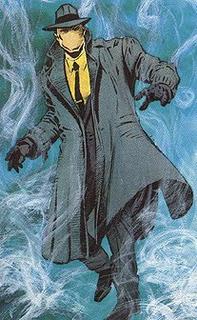
Justice League Unlimited on the Cartoon Network just keeps getting better. I think the main reason is that they get writers from the comic book industry who, for the most part, stay true to the original characters and attempt to integrate what's best about the comics into the series.
Alan Moore and Frank Miller changed the landscape of comics by injecting some postmodern realism into the mix. For instance, if there really were heroes who were that powerful, do you think everything would be just hunky-dory between them and the governments, especially the superpowers like the US?
And that is one of the themes that they've been playing upon this season. They've also been using many other of the DC Universe's characters. They've made especially good use of the "Charlton" heroes, (those characters which were created by Charlton Comics, were subsequently bought by DC and integrated into the DC Universe).
Steve Ditko, a Randite, created two characters -- The Question and Mr. A -- as Rand inspired superhereos (arguably, these two are the same character, just variations on a theme).
Alan Moore, when he did his groundbreaking Watchmen actually had the Charlton characters in mind. But DC (who published both Watchmen and owns the Charlton characters) wouldn't let him use the characters because they were then integrating them into regular DC continuity after the Crisis on Infinite Earths. So he changed them; Captain Atom became Dr. Manhattan; Blue Beetle became Nightowl, and The Question/Mr. A became Rorschach.
Rorschach was still portrayed as having far-right (near anarchist) politics; but Moore made him into more of a John-Birch type crackpot than a Randite. Recently Frank Miller featured The Question prominently in his sequel to The Dark Knight Returns (not as good as the first, but still worth the read) at his Rand-quoting finest.
Anyway Justice League Unlimited is doing a great job of presenting a Miller/Moore inspired Question. He quotes Ayn Rand, and is also a right-wing conspiracy buff. From their episode "Question Authority," The Question actually gives the "A is A" speech to Lex Luthor.
The Question: Everything that exists has a specific nature. Each entity exists as something in particular and has characteristics that are part of what it is. A is A, and no matter what reality he calls home, Luthor is Luthor.
Great stuff.
6 comments:
I've been enjoying JLU for some time, and have presented some thoughts on the show here. In general, I think the best approximation of the creator's voice(s) is Green Arrow, a self-confessed big government liberal who is nonetheless skeptical of the League's mandate.
" a self-confessed big government liberal who is nonetheless skeptical of the League's mandate."
I wouldn't necessarily call Ollie a "Big Government" liberal. He's more of a "wary of people in power" liberal, who usually focuses that watchful eye on mostly big business. I like to view him as a Limousine Liberal, who had his limo stolen from him. (He was a guy who'd inherited his wealth, and had it taken from him by those who were supposedly taking care of it for him).
He has faced off against parts of the government before, (though usually in the form of intelligence agencies, such as the CIA)
I'd suspect that Oliver would have voted for Nader in the last couple of elections.
My knowledge of Green Arrow is basically limited to the show. In the show, he calls himself a big government liberal in "Flashpoint" (maybe not in so many words; I saw the episode a few weeks ago). The quote is something like, "I always thought the role of government was to solve people's problems." Their portrayal may not be true to the comics; I wouldn't know.
I don't think he said "Big Government Liberal". (Again I'm working off memory, so I could be wrong). I'm sure he has called himself a "Liberal" and a "Lefty". In the show he spends most of his time criticizing other Leaguers, questioning their use of their power and position.
I'm not saying that Oliver wouldn't be for Big Government (at least in terms of social programs and welfare), but that has rarely been an issue in stories with him.
Actually, the portrayal is quite true to the comics. The way he argues with the other leaguers is very consistent with his history. His arguments with Hawkman (when they were both in the JLA) were quite the verbal "knock-down-drag-out" battles that threatened, on occasion to come to actual blows.
The only thing different between the JLU cartoon and the comic book versions of the character is that apparently he still has his fortune in JLU.
It's not often my comic book geekiness, and political geekiness intersect. Scary... ;)
I think the term GA used in Flashpoint was "I'm an old lefty...."
I'm probably wrong on this one. We're agreed that Arrow's a liberal of some variety, and I think we're agreed that he's not a libertarian. I originally mentioned GA because I think he's the primary vehicle for exploring the moral and political issues of superheroes. Arrow, along with Batman, are suspicious of the League despite being sympathetic to the organization's mission. The Question, for all of his conspiracy-mongering, doesn't seem to have any serious doubts about the League's mission - which is odd, considering his distrust for other powerful organizations. He thinks that Luthor is evil, and that Superman will not be able to avoid killing Luthor if the latter becomes President. But his willingness to sacrifice himself to save Superman (and the League) indicates that he thinks that Luthor is the problem, rather than Superman.
Post a Comment